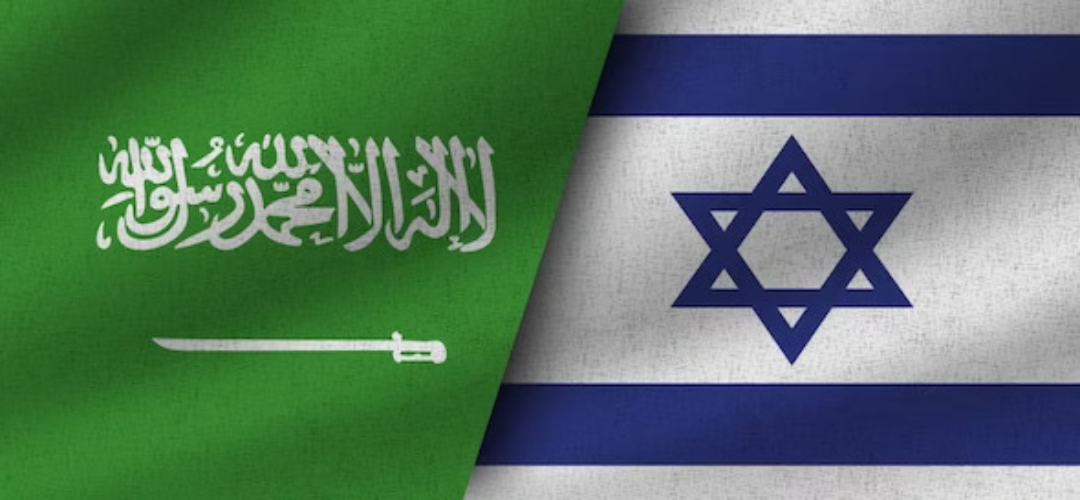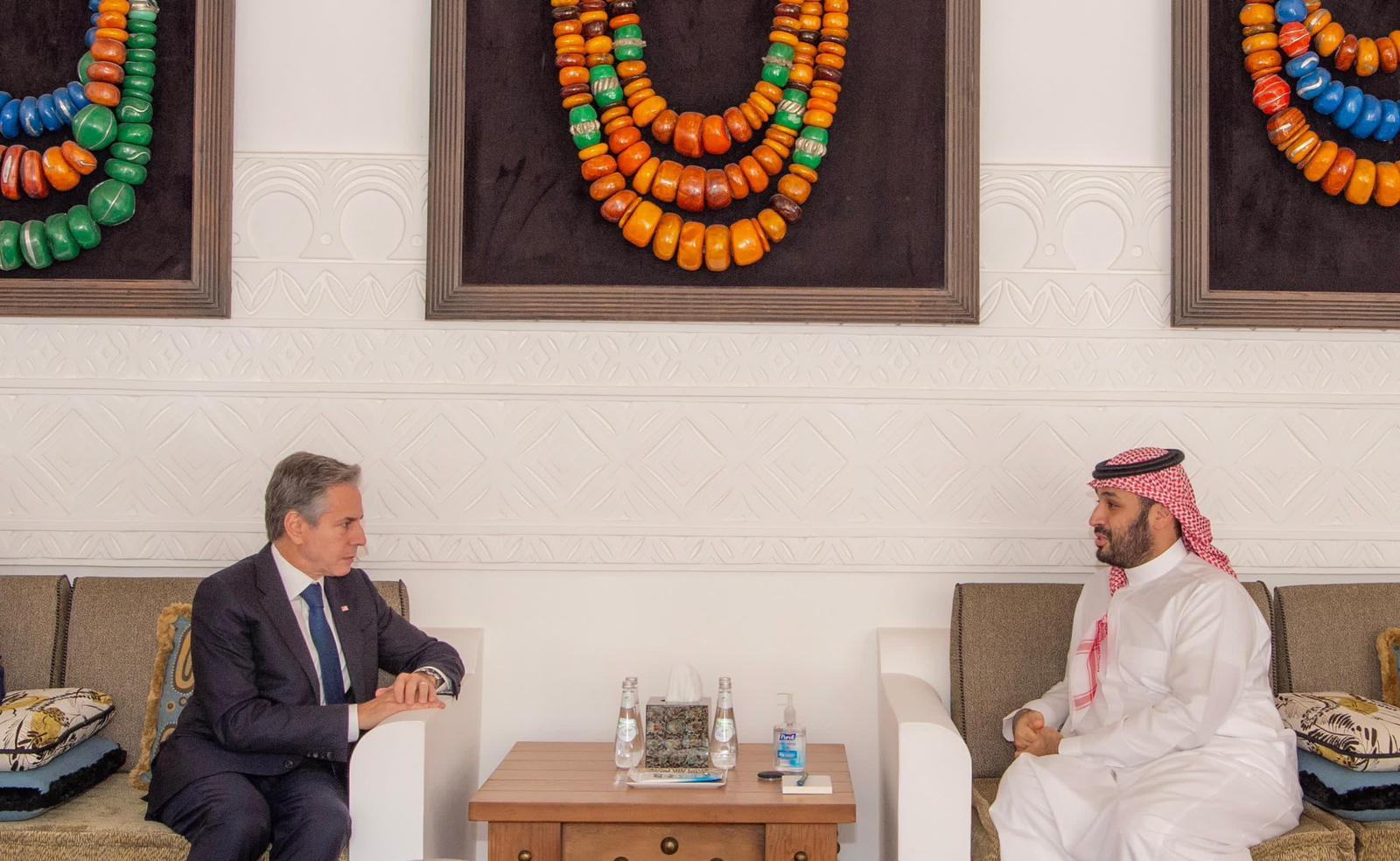Alternative Middle East Alliances – Saudi Arabia & Iran
October 21, 2023 | Expert Insights

In March this year, the world was surprised when bitter rivals, the doyen of Shia Islam Iran and the protector of Sunni umma Saudi Arabia, announced the resumption of their diplomatic relations. Even more revealing was that This deal was brokered by Beijing and followed months of secret negotiations. That this reproachment came at the right moment for the Arab world has now been revealed as the Middle East becomes a tinder box again.
Background
The relationship between Saudi Arabia and Iran has long been marred by intense rivalry, encompassing multiple contentious geopolitical issues. At the heart of their discord lies the battle for regional dominance, with both nations striving to extend their influence across the Middle East. This struggle has materialised in their support for opposing factions in pivotal conflicts, notably in Syria, Iraq, and Yemen, further exacerbating tensions between them.
Adding to the complexity are profound religious differences; Iran predominantly identifies itself as the leader of Shia Muslims, while Saudi Arabia positions itself as the paramount Sunni Muslim power. This religious schism has deepened the animosity, leading to a sectarian divide as both countries back their co-religionists in various nations, intensifying the conflict. Another contentious issue involves accusations of supporting terrorism. Saudi Arabia has accused Iran of aiding terrorism in the region, notably by supporting Houthi rebels in Yemen. Iran vehemently denied these allegations, counter-accusing Saudi Arabia of similar support for terrorism in the region, deepening the distrust between the two nations.
Moreover, economic interests have also fuelled the hostility between the two nations. As major oil-producing countries, Saudi Arabia and Iran have fiercely competed for market share in the global oil market. This economic rivalry peaked in 2016 when Saudi Arabia refused to curtail oil production to stabilise prices, a move perceived by Iran as a deliberate attempt to undermine its economy.
Matters escalated further with concerns over nuclear and ballistic missile advancements. Saudi Arabia staunchly opposed Iran's nuclear program, viewing them as direct threats to its security. This apprehension reached a critical juncture in 2018 when Saudi Arabia openly declared its intent to pursue nuclear weapons if Iran succeeded in developing a nuclear bomb, intensifying the stakes of their rivalry.
Has the ongoing war in Gaza brought them closer together, and will this new-found bonhomie endure after the guns fall silent in Gaza?

Analysis
China's pivotal role in this reconciliation underscores its expanding global ambitions and desire to present an alternative to the U.S.-led world order. With substantial economic interests in the Middle East, China's engagement in the region has been motivated by mutual economic benefits, a perspective welcomed by Saudi Arabia, which views China as a potential strategic partner. China's involvement further complicates the balance of power, challenging traditional U.S. dominance and redefining the geopolitical landscape.
This rapprochement holds transformative potential for the Middle East. Fostering intricate relationships between major powers can dissolve the longstanding Arab-Iranian divide, ushering in a new era of regional stability. In particular, the agreement could draw Iran closer to its Arab neighbours, paving the way for gradual regional stabilisation.
On the other hand, Chinese involvement is also a welcome addition to Middle Eastern and American interests. China serves as a natural mediator between the two countries. Iran, increasingly isolated in the Middle Eastern geopolitical landscape, relies on China economically, representing 30 per cent of Iran’s international trade. Moreover, Saudi Arabia relies on access to Chinese markets for its oil trade. The United States does not have this level of leverage between the parties to be diplomatically relevant. The mutual distrust with Iran is too deep to allow it to act as an honest broker.
If China could act responsibly and pour oil to calm the turbulent waters of the Middle East, it would find greater acceptance as a global player, even by the U.S. This position will be sorely tested in the ongoing Gaza crisis. So far, China has maintained a relatively lower profile, apart from initial statements demanding justice for the Palestinians and has refrained from making incendiary remarks or threats. Can its influence with Iran and Saudi Arabia be used to bring about a ceasefire, a quick return of Israeli abductees, and initiate the stalled process of a homeland for the Palestinians without antagonising the U.S. and its allies too much?
No doubt, the Hamas terror attack in southern Israel, followed by the massively destructive Israeli retaliation, is the worst thing that could have happened to tear asunder the delicate illusion of peace prevailing over the region. Hamas is funded and armed through the Iranian Revolutionary Guard Corps, and while Iran did not directly order the terror attack, it certainly enabled it economically and militarily. Moreover, the Iranian-backed militia Hezbollah occupies the northern Israeli border with Lebanon - ready to jump into the fray. While so far, a collusive synchronised offensive cannot be clearly deduced since Hezbollah incursions have been piecemeal and disjointed. But, as the situation worsens, greater cohesion could be generated from the North and through Syria, a staunch proxy of Teheran.
What could restrain Iran is an overwhelming strike by the Israeli air force, duly backed and bolstered by the U.S. carrier task forces, that could lay to waste an already ailing economy. While state TV in Iran is projecting public unity and mass anger at the Gaza atrocities, no one can assess the true nature of internal support for the oppressive regime in Teheran, which has still not fully recovered from its yearlong brutal oppression of its citizens, especially the women. If China puts on the brakes, Iran will have no option but to comply as its present economic lifeline passes through Beijing.
We are already seeing the effect of the rapprochement on the debilitating conflict in Yemen, which has now shown signs of winding down. In fact, the Houthis, obviously the victors in the civil war, are displaying a propensity to open a new front against Israel! However, it is important to note that Houthis have long advocated for an exit of foreign actors from the conflict in Yemen and have historically proven unreliable in accepting peace talks and ceasefires, especially if imposed by external forces. It is thus a question of the extent of leverage that Iran enjoys with Houthi leadership to determine the ending of hostilities in Yemen. Moreover, the political will to enter these de-escalating measures depends upon Iran’s perceived gains from establishing trade relations with Saudi Arabia.
On the economic front, the rapprochement promises economic dividends for Saudi Arabia and Iran, thus incentivising Iran to scale down its funding and arming of the Houthi rebels. Saudi Arabia is keen to get out of the mess in Yemen, which has cost it dearly, financially and in the lives of its soldiers.
Assessment
- Saudi foreign and economic policy will need to be balanced on a fine diplomatic line to work a de-escalating Iran policy coupled with a growing economic relationship. As long as the U.S. and its Western allies enforce the UN-imposed economic sanctions on Iran, trade with Iran cannot take off.
- For Iran, trade is not so much of a dividend as is a recognition by Saudi Arabia of its relevance and influence in the region. The Gaza conflict can further strengthen this position of Iran, considering that Riyadh seems to be in regular consultation with Teheran on the crisis, in fact, more so than even with Washington!
- The tensions within the Middle East are too deep and complex to be resolved by the mere exchange of diplomats. India and Pakistan have always maintained diplomatic relations, even amid all the wars they have fought! Any enduring detente between the two countries will require Saudi Arabia to strike a balance between regional diplomacy, economic cooperation, and its national security concerns.








Comments